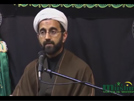Rules Of Conduct Of The Hajj
- Details
- Hits: 2088
RULES OF CONDUCT OF THE HAJJ
Be informed, O seeker of the Sacred House of All h, that All~h, the most Great and the most Exalted, has various houses: this obvious Kaba, the sacred mausoleum in Jerusalem, the Ever-Inhabited House (al-Bayt al-Mam Ù… r), the Arsh, till the matter reaches the true house which is: the heart of the believer (mu?min), which is the greatest of all these houses. Undoubtedly, each of these houses is approached through a set of rules of conduct and etiquette. It is important to display here the rules of conduct of visiting the Kaba, in addition to what is contained in books dealing exclusively with holy places, and we may point out to the true Kaba in general terms. So let us say the following:
Be informed that the objective behind legislating the hajj is to absorb this fact: The reason why the hajj was mandated is to get to know All h, to arrive at loving Him, feeling comfortable with Him, and these cannot take place except when one purifies his heart. The latter, in turn, cannot take place except when one keeps himself away from surrendering to desires, placing himself in the arduous task of performing the acts of worship, the outward and the inward ones. This is why the One Who brought the Shar ? ah did not make the rituals on one and the same level. Rather, He made them diversified: Each act of worship causes the removal of one abominable act of immorality. For example, offering charity and paying other financial obligations causes one to stop leaning towards perishing worldly wares. Fasting puts an end to one?s illicit desires. Performing the prayers prompts one to enjoin what is right and forbid what is wrong. So does the performing of other obligations.
As for the hajj, it incorporates all these many objectives. It contains the hardship of performing rituals each one of which suffices to remove one abomination. It involves generous spending, not thinking [for the time being] about the family, the children and the home country, staying away from the company of evil-doers, being tested with thirst during hot weather, etc. It also involves doing things which primary thinking does not readily accept such as throwing the stones, making the rounds, running, wearing the ihr~m clothes, etc.
Hajj contains another benefit which is: remembering the conditions of the Hereafter when one sees so many people on one and the same level, following the same path, especially in wearing the ihr~m and standing at both sacred places, in addition to reaching the place where the revelation descended and where the angels visited the prophets from Adam to the Seal of Prophets (?) and feeling the honor of walking where their purified feet once walked. It also includes the honor of visiting the sacred haram, something which softens the heart and brings about the purity of the soul.
A servant of All~h should keep in mind that Islam replaced monasticism with jih~d and hajj. One cannot reach such an honor except if he observes the rules of conduct and the etiquette as follows:











